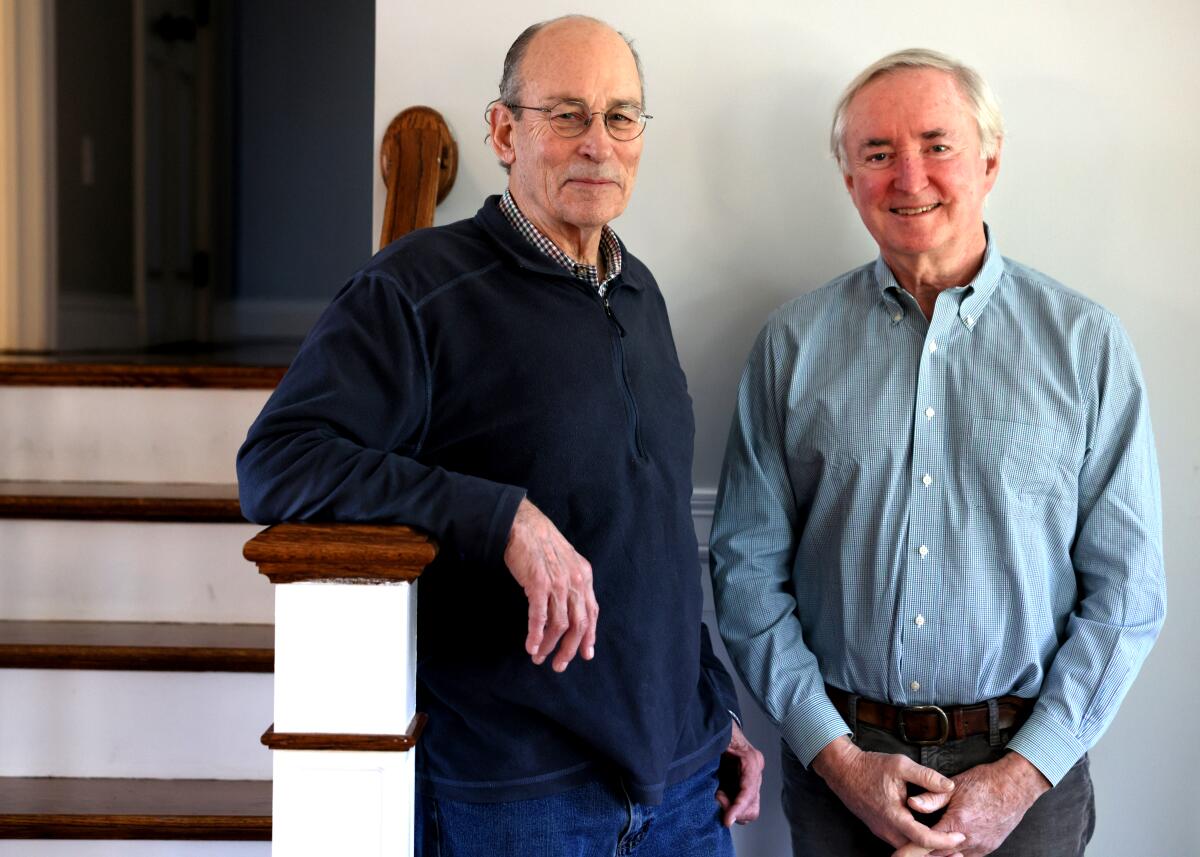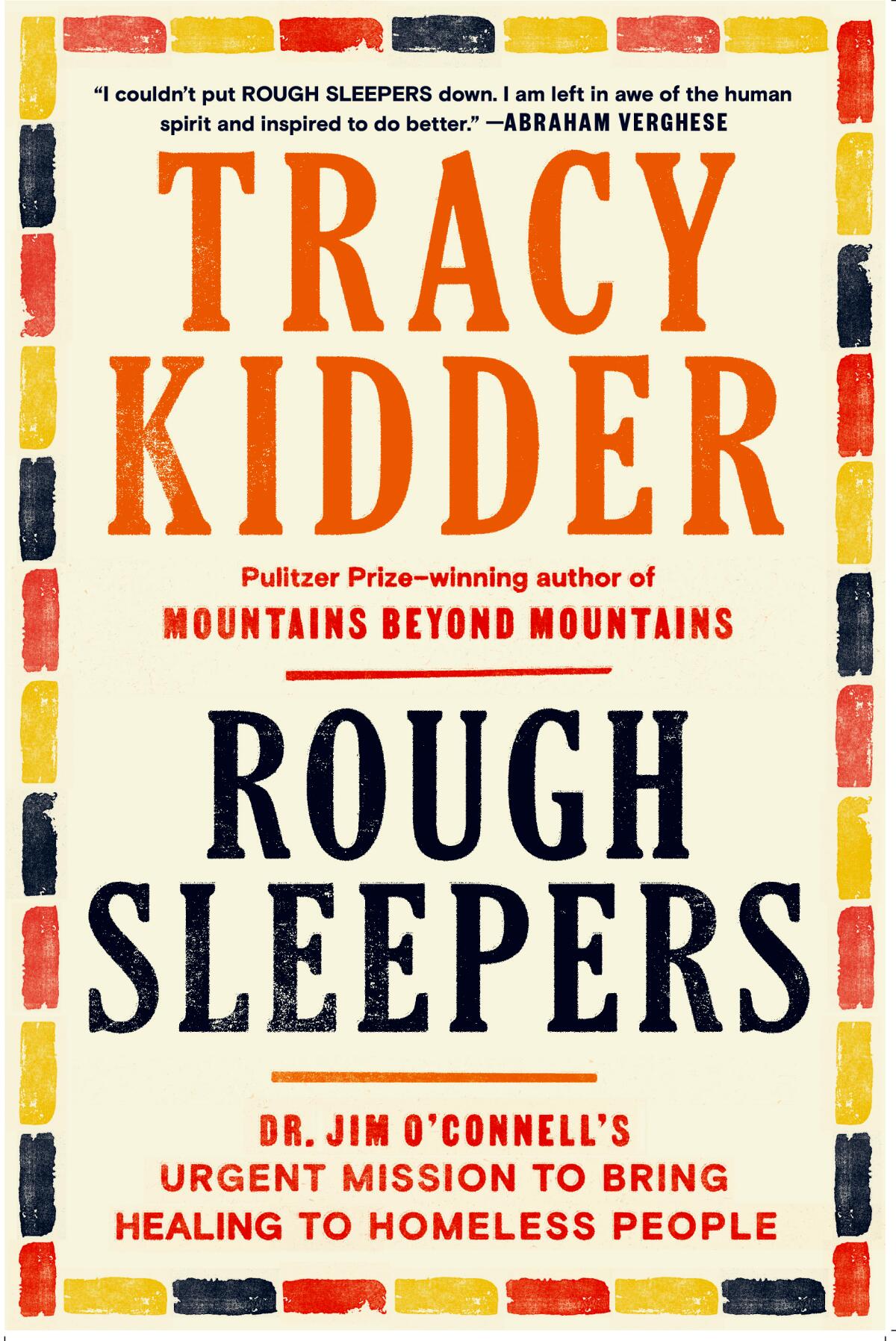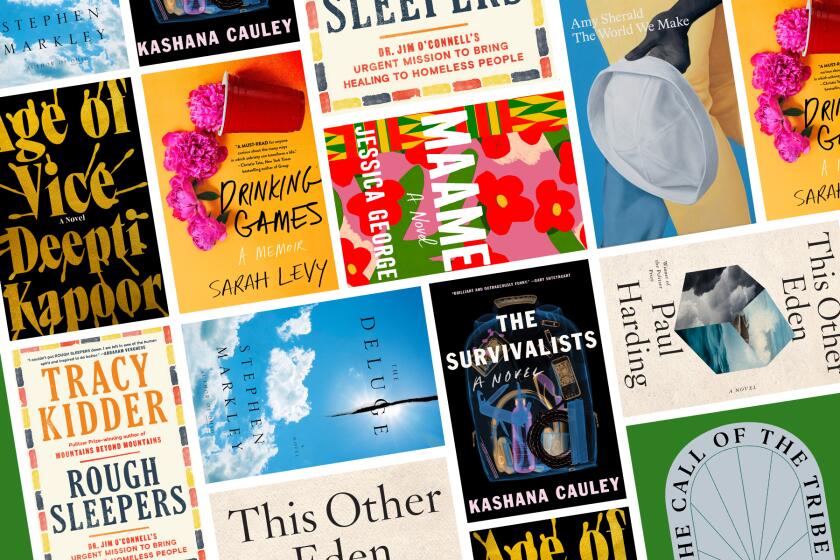It shouldn’t take a saint to ease homelessness. But Dr. Jim tries in ‘Rough Sleepers’

- Share via
Pulitzer Prize-winning author Tracy Kidder is perhaps best known for his book “Mountains Beyond Mountains” — a globe-trotting chronicle of Dr. Paul Farmer, the renowned infectious disease specialist who spent his life on a selfless mission to bring modern medicine to the world’s poorest countries.
The book helped solidify Farmer’s reputation as something of a saint by the time of his death.
Kidder wasn’t necessarily looking for another Ivy League-educated doctor to canonize. But one night in 2014, he climbed into a van stuffed with blankets, underwear, socks, soup and sandwiches and came face to face with Jim O’Connell, the physician who founded Boston’s Health Care for the Homeless Program.
Or “Saint Jim,” as he is known in the close-knit medical and philanthropic circles of Massachusetts.
For three decades, O’Connell has been making house calls to the streets, seeking out the hundreds of chronically homeless people who sleep each night huddled under tents and tarps in doorways and alleys and on stoops and park benches.
To these men and women, and the many others who live in the city’s shelters, O’Connell is “Dr. Jim” — a beloved best friend, staunch ally, trusted confidant and dependable dispenser of sound medical advice. He has built one of the nation’s most coordinated and comprehensive healthcare systems for unhoused people.

Kidder couldn’t resist making this mild-mannered, self-effacing, ruddy-faced man the subject of his forthcoming book, “Rough Sleepers,” borrowing a 19th century British term for people who live on the streets. Kidder joins the Los Angeles Times Book Club on Jan. 26 to discuss his latest work with Times columnist Steve Lopez.
“I was just astonished at the relationships that he had with these people,” Kidder told me over Zoom from his home near Northampton, Mass.
“I mean, he’s not a saint. He hates being called one because he knows that he isn’t,” Kidder added, noting that O’Connell is uncomfortable with praise, much less beatification. “But if you deny that you’re a saint, it kind of improves your qualifications, right?”
For five years, Kidder followed O’Connell with a notebook in Boston, much as he did with Farmer across Haiti, Peru, Cuba, Russia and Mexico.
The author tagged along in the van, watching as O’Connell and his team patiently and affably used the skills of social workers to persuade unhoused people to come in for medical treatment. Every night, the doctor carried a small bag containing basic first-aid gear, a stethoscope, a blood-pressure cuff, a pulse oximeter and ear thermometer.
“His patients, and prospective patients, were sleeping in doorways, arguing drunkenly with statues in parks,” Kidder writes. “I had rarely spoken to such people and congratulated myself when I had. For me, the night’s tour was a glimpse of a world hidden in plain sight. I was left with a memory of vivid faces and voices, and with a general impression of harsh survival, leavened by affection between a doctor and his patients.”
At times, Kidder told me he felt as if he were back in Haiti with Farmer. The discarded and forgotten rough sleepers he encountered alongside O’Connell in Boston — not unlike the discarded and forgotten rough sleepers of Los Angeles — were plagued by ailments that shouldn’t exist in a country with as much money and modern medicine as the United States.
O’Connell and his team regularly treated unhoused people who hadn’t seen a doctor or a dentist in years. Many had scabies, untreated hernias and pneumonia, and were infested with lice. (From “Rough Sleepers,” I learned that to clean a wound of maggots — another frequent condition among rough sleepers — you first stuff the wound with raw ground meat to draw them out.)
One man had a cancer that had paralyzed the left side of his face, the result of what had once been an easily treatable basal cell carcinoma. Others had been released from the hospital with blood pouring from their ears and eyes.
Often drugs and alcohol ravaged bodies and minds alike. Some unhoused people tried and frequently failed to get clean, creating a constant churn of the same patients looking to O’Connell for help curbing their withdrawal symptoms. Others, unable to get past personal trauma, never tried to get a handle on their addictions at all.
“Many of the people I met had unbelievably bad childhoods,” Kidder told me. “Terrible, terrible, terrible abuse.”
Such patients are a far cry from those O’Connell thought he’d be treating as a new doctor. The salutatorian of his class at the University of Notre Dame, he studied philosophy and theology at the University of Cambridge in England, spent a stint learning to listen as a bartender and at age 30, entered medical school at Harvard University.
Ultimately, he passed up a prestigious fellowship and career track at an equally prestigious hospital to build the Health Care for the Homeless Program. O’Connell, as Kidder put it, lived life backwards.
He worked long hours, riding in the van and staffing clinics. He cared for rough sleepers and watched them die, often inebriated and in the cold, but sometimes newly sober and in their own homes. In doing so, he sacrificed his personal life. He put off having a family to the point that at age 69, when many of his peers were retired with had grandchildren, O’Connell had a 3-year-old daughter and was still working.
“It seemed obvious,” Kidder writes, “Jim would keep growing old with his patients for some time.”
To read “Rough Sleepers” is to confront not only the consequences of homelessness, but to wrestle with knowing that, as terrible as the problem is now, it would so be much worse if not for the sacrifices of people like O’Connell.
Bethanne Patrick’s picks for January 2023 include an Indian gangster tale, a dystopian epic and musings from Amy Sherald and Mario Vargas Llosa.
If not for him, some 11,000 unhoused people in Boston might not get help every year. The Health Care for the Homeless Program is well-funded and has hundreds of employees, due to the brain trust that O’Connell spent decades of his life building.
Such selflessness is absolutely something to be admired. But in that admiration, it’s easy to forget that, as a society, we’re basically allowing individuals to give of themselves, letting them chip away at an impossible cause to the point of being called “saints,” rather than muster the will to solve what are essentially human-made problems.
That so many men and women and, yes, children live in squalor on the streets is the result of decisions that leaders in government and in business made years ago and continue to make every single day.
In some ways, as Kidder notes, the nation’s homelessness crisis goes back to the politics of the 1980s. We’re talking a dysfunctional and overly punitive criminal justice system, and a failure to provide adequate services after the mass closure of psychiatric hospitals. And there are other roots, too, including the legacy of racist housing practices that have everything to do with why Black Americans are disproportionately represented among the unhoused.
We, as a society, continue to worship the almighty dollar. The gap between the extremely wealthy and the extremely poor keeps growing, but like the inequities in healthcare that Farmer railed against, it’s a status quo that most Americans seem willing to endure.
And yet, because of this, there’s also apathy and helplessness about homelessness. There’s finger-pointing, as California’s governor did during his annual budget speech this month, blaming cities for not moving fast enough and spending the state’s money wisely enough to “clean up” encampments.
There are signs of hope, though, at least in Los Angeles. Mayor Karen Bass continues to roll out her coordinated strategy to quickly and humanely get homeless people into shelters and housing. Just as important, she has pledged to expedite the construction of more affording housing for everyone, as a way to lower rental prices that have risen faster than wages in recent years mostly because of the short supply.
Ultimately, these are big problems that call for seismic shifts in society’s values and political priorities. O’Connell has no time for that. He can’t wait. He has rough sleepers to heal.
“There is the here and now,” Kidder said, explaining the doctor’s philosophy. “These are people in dire need and we need to try to provide them with what they need to survive.”
That’s “Saint Jim.”
“He presents some of the same problems to a writer that Paul Farmer did for me, which was what my beloved editor once called ‘the problem of goodness,’” Kidder told me. “How do you persuade a cynical age that people like this actually exist?”
Book Club: If You Go
What: Author Tracy Kidder joins the L.A. Times Book Club to discuss “Rough Sleepers” with Times columnist Steve Lopez.
When: Jan. 26 at 6 p.m. Pacific.
Where: Live streaming online. Sign up on Eventbrite.
Join us: Sign up for the book club newsletter for latest news and events.
More to Read
Sign up for our Book Club newsletter
Get the latest news, events and more from the Los Angeles Times Book Club, and help us get L.A. reading and talking.
You may occasionally receive promotional content from the Los Angeles Times.












